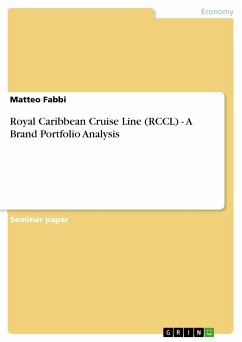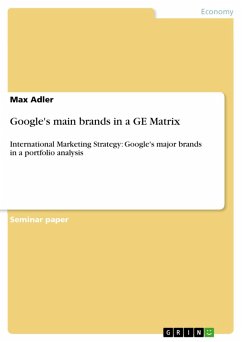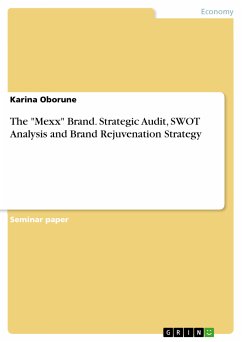
Royal Caribbean Cruise Line (RCCL) - A Brand Portfolio Analysis (eBook, PDF)
Sofort per Download lieferbar
Statt: 19,95 €**
16,99 €
inkl. MwSt. und vom Verlag festgesetzt.
**Preis der gedruckten Ausgabe (Broschiertes Buch)
Alle Infos zum eBook verschenkenWeitere Ausgaben:

PAYBACK Punkte
0 °P sammeln!
**Preis der gedruckten Ausgabe (Broschiertes Buch)
Seminar paper from the year 2010 in the subject Business economics - Offline Marketing and Online Marketing, grade: 70%, University of Westminster, course: Branding Management, language: English, abstract: Corporate brands are defined by many as one of the most fascinating phenomena of the 20th century's business environment. In today's reality they are also considered sometimes as a religion, a belief, or even a lifestyle; they are adored, venerated, and coveted, by people and organizations alike (Keller, 2008). Balmer in his article Corporate Brands: what are they? What of them? (2003), defi...
Seminar paper from the year 2010 in the subject Business economics - Offline Marketing and Online Marketing, grade: 70%, University of Westminster, course: Branding Management, language: English, abstract: Corporate brands are defined by many as one of the most fascinating phenomena of the 20th century's business environment. In today's reality they are also considered sometimes as a religion, a belief, or even a lifestyle; they are adored, venerated, and coveted, by people and organizations alike (Keller, 2008). Balmer in his article Corporate Brands: what are they? What of them? (2003), defined corporate brands as a product of an organization's corporate strategy, mission, image, and activities, which communicates brand's values and in the meantime affords a means of differentiation from their competitors. It is also said to enhance the esteem and loyalty of the stakeholders for the organization. This paper will give an examination of the nature, the typology and the management of a well known corporate brand operating in the Tourism industry: Royal Caribbean Cruises Line Ltd (RCCL). Adam Weaver in his article Complexity at sea: Managing brands within the cruise industry (2008), stresses how in the late eighties, corporate consolidation within the cruise industry, had as a result many cruise brands to be a part of a brand portfolio. In the complexity of the cruise industry, culture, languages and country of origins represent a major challenge for managers when adapting their brands across an international environment and portfolios are always bigger (Weaver, 2008). Originally Royal Caribbean Cruise LTD's strategy to overcome the complexity of this issue has been to opt for a Global brand strategy instead of a multiple decentralized local brands strategy, which on the other hand, has been Carnival Corporation's main strategy, also main RCCL competitor, as well as market leader for the global cruise industry (Weaver, 2008). However some of the latest operations made by RCCL have suggested a fundamental shift on RCCL brand strategy, which will be a focal point for the second part of this report. Before that, an indication about the size of the industry and an introduction of its main players will be essential in order to understand the dynamics that influence portfolio management strategies.
Dieser Download kann aus rechtlichen Gründen nur mit Rechnungsadresse in A, B, BG, CY, CZ, D, DK, EW, E, FIN, F, GR, HR, H, IRL, I, LT, L, LR, M, NL, PL, P, R, S, SLO, SK ausgeliefert werden.













